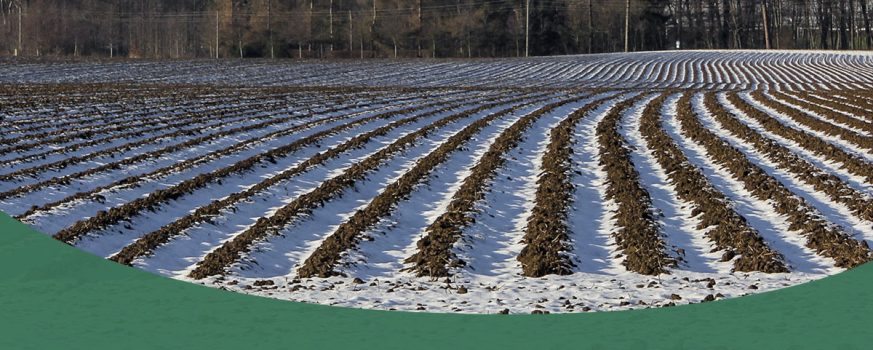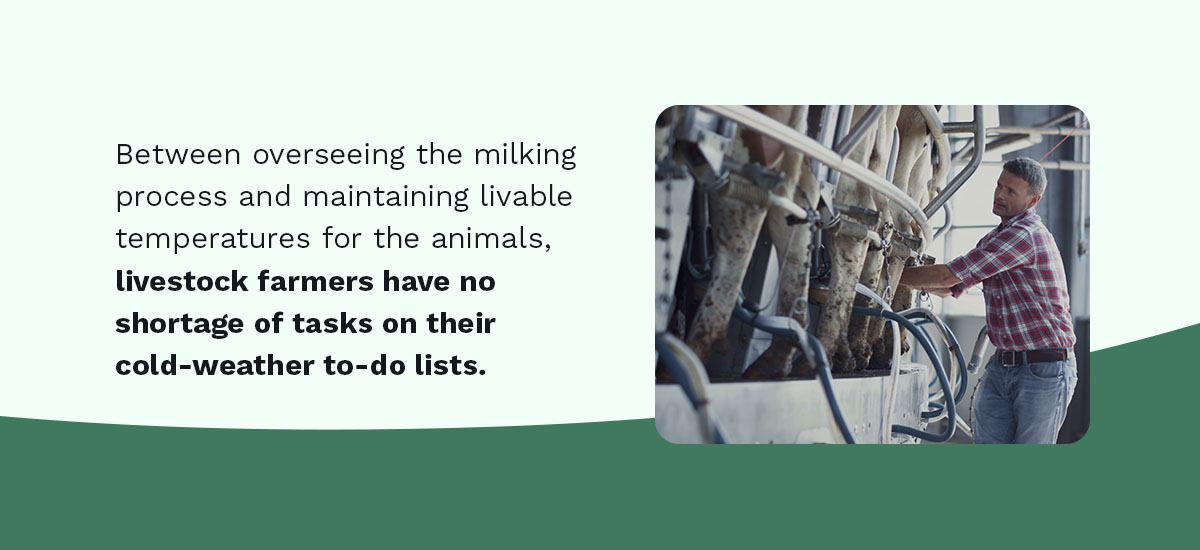
Farmers have a slight break in winter due to the lull in crop growth and harvesting. However, farms still bustle with activity despite the dips in temperature.
Why are farmers busy in the winter? Explore the different tasks farmers complete as the cold weather sets in, from crop planning and equipment maintenance to property repairs.
Do Farmers Work All Year Round?
Yes — farm work never ceases, even amid the frosty seasons. Agriculture is a labor-intensive job requiring year-round attention. During winter, farmers usually focus on soil preparation, equipment maintenance, pest control and irrigation more than planting and harvesting. However, some farmers grow cold-weather crops during chillier seasons, such as:
- Broccoli
- Brussels sprouts
- Cabbage
- Cauliflower
- Kale
- Leeks
- Onions
- Radishes
- Swiss chard
Many hardy vegetables can withstand ambient temperatures of 28 degrees Fahrenheit — sometimes even lower.
What Do Farmers Do in the Winter?
Farmers find plenty of ways to keep busy in the frigid months. Let’s look at some standard cold-weather farming tasks below.
1. Planning for the Next Growing Season
Winter is ideal for reviewing last season’s notes and finding improvement opportunities. Here are some questions to consider:
- What crops grew well, and which ones didn’t?
- What crops did I have too much of?
- What crops did I need more of?
- What crops did customers buy the most of?
- What were the least popular crops with customers?
You can use these answers to plan for the next growing season. For example, if corn showed particularly high sales rates among your crops, consider growing more next season. If you grew abundant eggplants, but they didn’t sell nearly as well, try reducing this number to make room for more in-demand crops.
Winter is also a prime time to order more supplies like seeds, pesticides and any other inventory you might be low on. Additionally, you can use this time to assess last season’s growth conditions and quality. Adjust your farming processes based on this information.
For instance, did you water your crops sufficiently? Did your plants contract any diseases? Did you use the right pesticides for your crops? Consider whether any changes in planting location, soil conditions or irrigation are in order.
2. Tending to the Property
While farmers tend to be outside more during planting and harvesting seasons, they do spend some time outdoors during winter. They might take a few hours to walk around the farm and inspect fencing, barns and silos. Here are some things to look for:
- A leaky or sagging barn roof
- Holes or missing sections in the siding
- Rotting rafters or structural beams
- Worn or broken fencing
If you notice these signs or other indicators of damage, you can use the downtime to make any necessary repairs. Additionally, you’ll need to expand the barn if you notice the stalls have become too small for your livestock.
Winter is transportation time for many farmers. For example, if you harvest large amounts of grain, you might leverage the snowy months to transport this inventory to processing plants. That way, you can make room for newly harvested grain and other crops.
3. Caring for Livestock
For dairy and cattle farmers, winter doesn’t look much different from spring and summer. Livestock requires care year-round. Temperatures can drop below freezing in many parts of the country, so giving animals a warm and dry space during winter is vital.
Calves need well-maintained body temperatures for healthy growth and development. These animals are most comfortable at temperatures of 55-70 degrees Fahrenheit during their first month. They can experience cold stress with consistent exposure to temperatures below 50. Therefore, it’s critical to keep your barn properly heated in winter.
Depending on the type of livestock, you may need to move your herd into a more insulated shelter. Here are other essential measures for keeping livestock safe during winter:
- Stock up on food and maintain a consistent feeding schedule — some animals’ dietary needs differ in winter, so you may need to adjust these schedules accordingly.
- Provide warm, dry bedding.
- Position calf hutches so they face away from the wind.
- Ensure animals are up-to-date on vaccinations and other preventive health measures.
Water is another key consideration. Farmers often use natural sources to provide drinking water for livestock, but these bodies of water can freeze over in the winter. Before the crisp weather rolls around, establish a backup water source or install a deicing system. Remember to monitor this system carefully, as well.
Between overseeing the milking process and maintaining livable temperatures for the animals, livestock farmers have no shortage of tasks on their cold-weather to-do lists.
4. Bookkeeping
Farmers can use this downtime to manage their finances. They might prepare tax documents, identify profits and losses, and adjust for the upcoming year.
Bookkeeping helps farmers plan strategically and realistically. They can determine which methods brought in the most revenue and what inventory to stock up on for the approaching season. By examining sales records and planning financially, farmers can more accurately forecast and capitalize on next year’s outcomes.
Inspecting market trends and projections can also help farmers succeed in the competitive agricultural industry. For example, what do commodity prices look like? How much will farm labor expenses increase next year? Another tip is to consult fellow farmers for advice. Find out what they’re doing to drive capital growth and whether these methods could benefit your operations.
5. Maintaining Equipment
When growing and harvesting are in full swing, finding time to perform routine machinery upkeep can be challenging. Yet, farmers rely on functional equipment during peak seasons more than ever.
To that end, off-seasons are the optimal time for preventive farm equipment maintenance. Inspect your fleet of machinery and tools to ensure everything runs smoothly, including:
- Cutters and shredders
- Harvesters
- Seeding equipment
- Spraying equipment
- Tillers
- Tractors
- Trenchers
- Wheel loaders
Swap out filters and other parts as needed. If your equipment is worn or damaged, repair or replace these units as soon as possible to prepare for busy seasons. Tractors and other machinery can also become caked with dirt and debris over time. Cleaning your equipment is important to prevent the spread of pests and bacteria.
When cleaning sprayers, remember to add antifreeze to winterize them for the cold season. Many farmers opt for RV antifreeze since it’s nontoxic.
Choose CropCare® for Specialized Spraying Equipment
Whether it’s December or July, CropCare® is ready to provide the spraying equipment you require. From trailer sprayers to vegetable equipment like mulch layers and lifter-wrappers, we supply high-quality solutions to help maintain your crops and property year-round.
No matter the season, CropCare® is your source for specialty sprayers and crop equipment. To learn more about our solutions or purchase our products, contact us or find a dealer near you!



